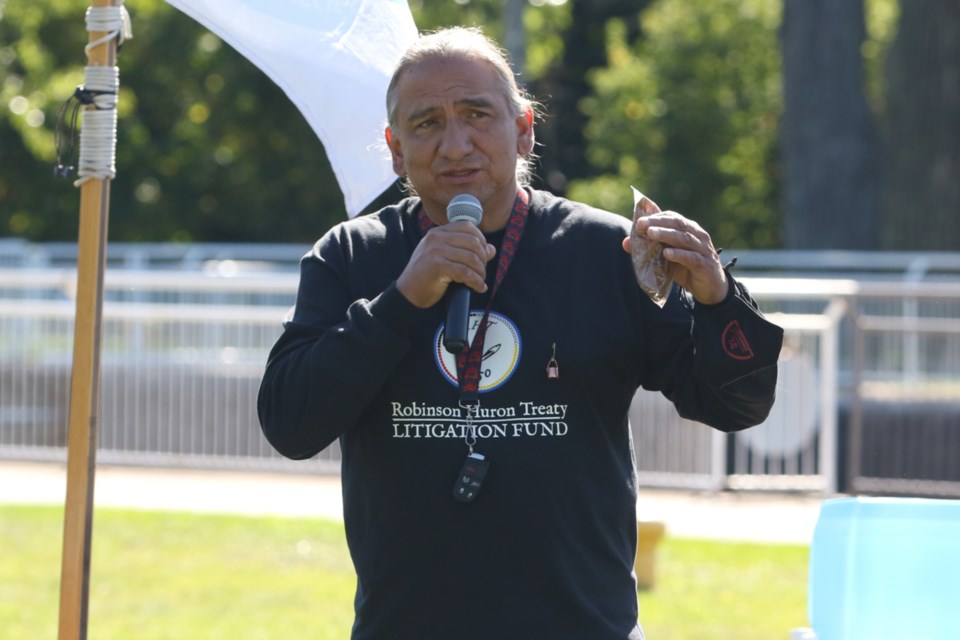BATCHEWANA FIRST NATION — The elected leader of Batchewana First Nation says if anything, he is looking forward to working with King Charles with hopes of “moving the yardstick” in terms of treaty relations between Canada and Indigenous Peoples.
Chief Dean Sayers recalls a 2012 meeting with the former Prince of Wales in Toronto where Crown representatives, and First Nation Leaders from across Canada discussed outstanding treaty issues.
It was at that meeting Sayers, representing the 21 Robinson Huron Treaty chiefs, presented the former Prince with a small birch bark canoe as a visual representation of jurisdiction in treaty territory.
“I’m explaining to him how that canoe is full of our jurisdictions,” Sayers recalled. “It was full of our jurisdictions when we went to treaty, and it was still full when we left the treaty meetings and it’s still full today, and that we want to work on a course with the Crown to see that recognition and have a true sharing relationship.”
Earlier this year the Supreme Court of Canada made a decision to proceed with hearing Ontario’s appeal of the Robinson Huron Treaty annuities case, prompting calls from the Robinson Huron Treaty Litigation Fund for Premier Doug Ford to honour an election campaign pledge to negotiate a settlement of the case.
The Ontario Court of Appeal had previously upheld the trial decision that ruled in favour of Robinson Huron Treaty signatories and encouraged the parties to negotiate a settlement.
Canada decided not to appeal the trial decision and has since committed to negotiating a settlement that would see Robinson Huron Treaty beneficiaries receive more than the annual $4 treaty payment that has been in effect since 1874.
“We as a people expect to see an alignment between us as parties with regards to how we can both move forward in a mutually beneficial relationship aligned with the original expectation that we would share — and that’s still our hope, that we will properly share and we will recognize each other and how we always committed to appreciate, respect and honour each other’s governance systems and jurisdictions,” said Sayers. “I’m still of that mindset that our historic ancestors had — I think that we as Indigenous people nowadays are really well aware of that which we reserved for our people in our aspirational expectations and how we would evolve, and we just haven’t had that willing party on the other side of the table.
“I’m hoping King Charles can compel Canada to have proper parties at the table to be more aligned with our original spirit of intent that we had when we embraced each other when the newcomers first arrived at our land.”
A decade after meeting with the former Prince to discuss treaty relations, the leader of Batchewana First Nation is hopeful for a similar meeting with King Charles as Canada's new head of state.
“I’m hoping now it can happen now that he’s at the helm,” Sayers said.
King Charles recently succeeded Queen Elizabeth II, who died Sept. 8.
“We do send our sincerest condolences to her majesty’s family and her subjects — it’s part of how we as a people, regardless of how turbulent our history might have been, it doesn’t reflect how we will react,” said Sayers. “We will continue to be kind, diplomatic and we will provide comfort where necessary, as per how we as a people have always taken receipt of people from all around the world that have come upon our land.
“We do recognize the grief and the process that the people that are aligned with Great Britain are going through.”
Although the death of the Queen has been met with some derision from Indigenous Peoples across social media, Sayers says he’s “looking forward” after a “horrendous history of colonization” and the trauma that comes with it.
“We’ve been tremendously successful in being able to stay alive as a people, and we’ll continue to do that,” he said. “So that’s where I’m going to focus my attention: how can we move the yardstick with new players at the table?”
